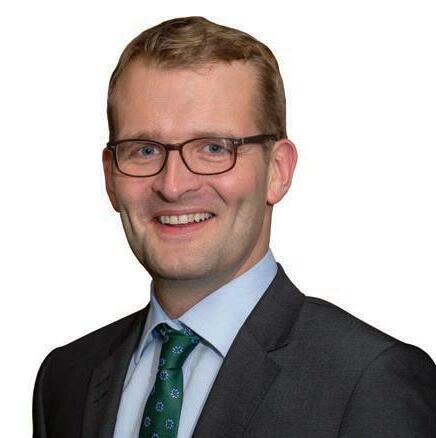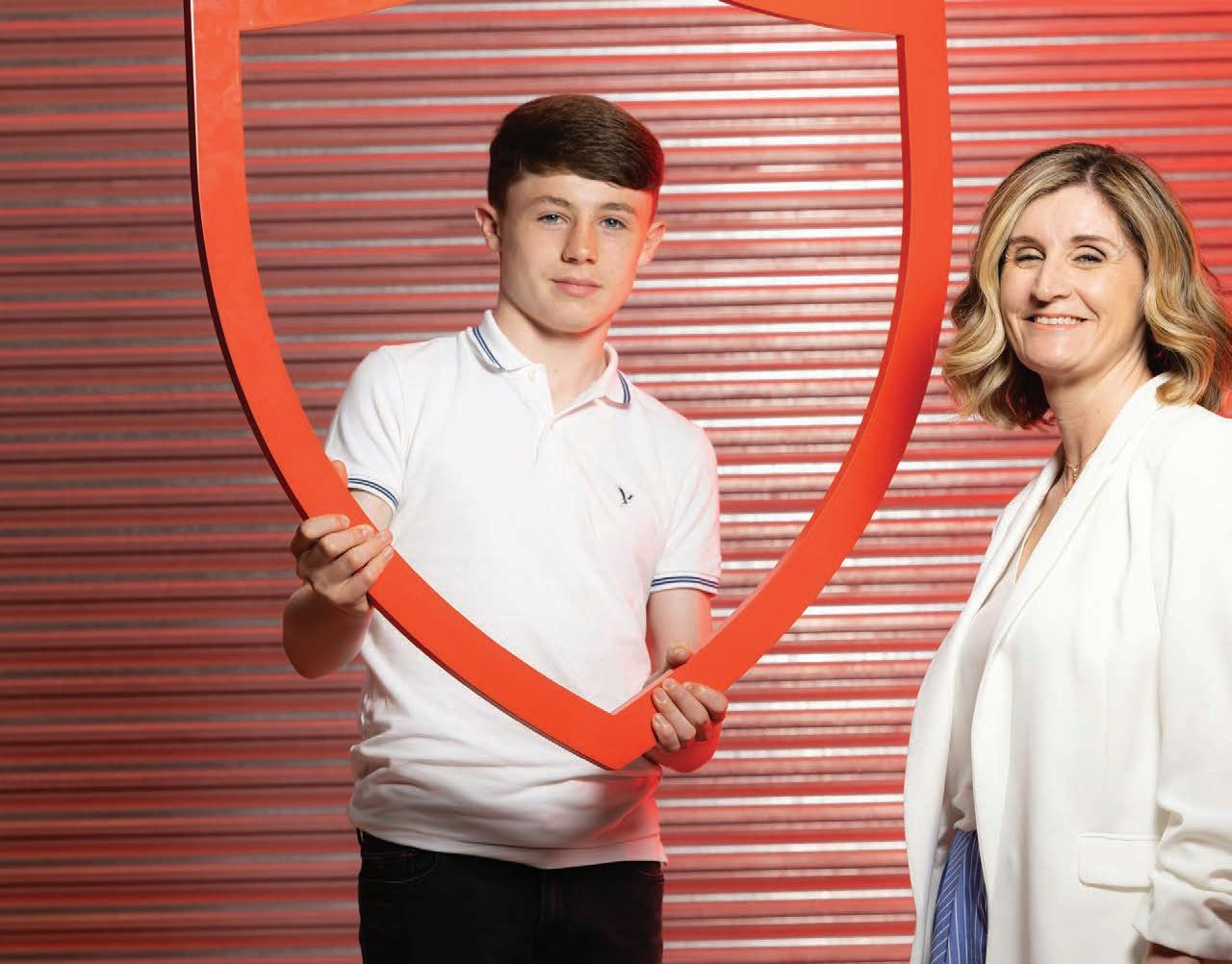
13 minute read
Marianne Heron
As I See It

Advertisement
Marianne Heron Refugee chaos: a better welcome is needed


Having been Ireland of the Welcomes for Ukrainian refugees arriving here, the current reality is now like a modern Nativity story despite public goodwill.
There is no room at the inn.
A situation where the latest 250 arrivals in the ongoing low of 41,000 refugees to date, had to be stabled at Dublin airport on airbeds or the floor is unacceptable. Earlier, there was a delay in providing temporary tented accommodation at Gormanstown army base in Co Meath. Third level accommodation for refugees is about to dry up and numbers seeking asylum from other countries has already doubled to 6,500 this year.
The situation is chaotic. It’s the kind of mess that results when individuals and volunteers try their best but are thwarted through lack of an overall management plan and strangled by bureaucratic red tape.
Accommodation offered by individuals has fallen far short of the original number promised, with the system under the Red Cross for contacting and vetting accommodation simply not working. Of the vacant homes offered 79 % were withdrawn, unsuitable or the owners couldn’t be contacted. Similarly, 74% of offers of shared accommodation didn’t work out. Other have made informal arrangements with refugees, avoiding delays involved in official channels.
The Garda vetting system for homeowners offering accommodation for Ukrainians with children – which already involves long delays for locals – is another bottleneck resulting in the loss of 5000 homes on offer. Does this form filling system where householders have to supply every address they have lived at really work as a form of protection? Surely a more streamlined checking system could be found?
The Taoiseach has urged ministers “to put their shoulders to the wheel” to resolve the crisis, but the result is likely to be more of the same piecemeal approach. The brutal war in Ukraine is not going to be short lived and the flow of refugees is going to continue. It should clear, despite the best efforts of ministers and departments involved, that a dedicated task force or agency is needed to deal with not only with the crisis but the long-term refugee situation. Above all it needs a fresh approach to sourcing accommodation, both those offered by the public s with a streamlined contact and vetting process and new options which could be used. Contracts could be offered to holiday home owner, as there are 1,000s or large vacant buildings and homes, near empty convents or monasteries, and then the option of modular homes (why aren’t we using these to solve the native housing crisis ?)
The agency would need overall responsibility for the care refugees and the authority to co-ordinate the efforts of volunteers. There are 65 organisation under the umbrella of the Ukraine Civil Society Forum alone.
What we have at present – with the notable exception of the Department of Education which has worked wonders in getting Ukrainian kids into school – is a chaotic despite all the voluntary effort and goodwill. An 80% majority of Ukrainians here are women with children, many want to work and earn in order to integrate more fully but they face a language barrier and have child care needs. While there are volunteer efforts why not open group evening classes in schools or allow Ukrainians to offer childminding? Some women are highly qualified – this in a country with skill shortages – but their qualifications aren’t recognised so they end up in menial part- time jobs. Why can’t we have an enabling and imaginative approach instead of nay saying rules?
Many of the Ukrainians we are hosting will eventually return home but some will stay, joined by partners and enrich our society. Others seeking asylum from different countries are more likely to stay, but they enter the direct provision system although a majority here agree they should be treated equally.
It’s not enough to open the door, the Government need to make it easier for refugees to integrate and join our society.
Phelan welcomes signing of legislation to abolish in-patient charges for children

Fine Gael TD, John Paul Phelan, has welcomed the signing into law by President Michael D. Higgins of the Health (Miscellaneous Provisions) (No. 2) Act 2022.
Once commenced, the Act will provide for the abolition of both overnight and day case public in-patient charges for children less than 16 years of age in all public hospitals and also provides for the introduction of a free contraception scheme for women aged 17-25. “ e two measures are scheduled to come into operation by early September this year. I welcome the good news that the President has signed this very important Act, as the measures provided in this legislation are very much intended to support access to care for those who need it in a manner that is fair and a ordable. “Abolishing acute in-patient hospital charges for children under 16 is focused towards easing the towards easing the nancial burden of nancial burden of parents or guardians when bringing their when bringing their child to hospital for child to hospital for in-patient care. in-patient care.
“Given that the “Given that the costs of prescription costs of prescription contraception are contraception are typically faced by typically faced by women, the scheme women, the scheme will impact positively will impact positively on gender equity, re-on gender equity, reducing costs for women, ducing costs for women, but also bene ting but also bene ting their partners their partners and families, starting with women aged 17-25. “In the context of current cost-ofliving challenges, I am delighted the I am delighted the
Government is Government is able to intro-able to introduce these duce these two signi cant two signi cant measures measures aimed at alle-aimed at alleviating cost viating cost pressures for pressures for individuals individuals and families and families when seeking when seeking to access to access healthcare.” healthcare.”

Can Omega 3 change the way you think, feel and age?
CLAIR WHITTY
Wild Atlantic Health, an Irish company down in Cork, has developed a number of innovative home health tests to measure nutritional de ciencies. ey’re a passionate bunch of people who feel that preventive health is the future.
Knowing your Omega-3 Index identi es the underlying level of silent in ammation in your body and is more informative than a standard cholesterol test. e Omega 3 Index measures the % of Omega 3 in your red blood cells. Lower than 4% is the danger zone and 8-12% is the optimal level.
Levels higher than 8% help maintain heart, brain, eye and joint health and reduce the risk of cognitive and cardiovascular problems and, amazingly, increase life expectancy by 5 years. at in itself is motivation to take the Test but there would be little point in me telling you about it unless I had done one myself. I got my husband Denis to take the test too. He takes sh oils regularly and eats tins of mackerel a couple of times a week, while I tend to be on and o sh oils.
Well, lo and behold, the results came back online. I had naively thought mine would be better than Denis’s, but the proof is in the blood. His result was excellent being in the optimal range at 8.12%. I was at 5.22%. He is perfect! I was in the ‘you need to work on this’ and probably won’t live this down.
Now that I have a starting point, I will re-test in four months to see if taking sh oils regularly and eating more oily sh helps improve my numbers. I will let you know how I get on. You can get omega 3 from plant sources too, but your body has to convert it into active EPA and DHA. e Test requires a simple nger prick and a sample of blood is dropped onto a collection card. e card is registered online and put into a prepaid envelope and posted to the lab. Within 2 weeks you’ll receive an email with your results and recommendations.
I will be on the radio soon talking about testing. We have invited Wild Atlantic into our stores to tell you more about these exciting products and to answer all your questions. You can nd out more details on our website www.naturalhealthstore.ie.

Shop online at www.naturalhealthstore.ie where you’ll be able to take a look at these brands. Natural Health Store, Market Cross Shopping Centre Phone: 056 7764538 Email: info@naturalhealthstore.ie



Up to 87% of parents in the South East worry about the content their children could see online, according to new Vodafone Ireland study. e study also found that 67% of children from Leinster use connected devices daily, and 52% are online for one to three hours a day.
To mark the launch of Secure Net, a new digital protection product, Vodafone Ireland conducted the national study into the Irish public’s concerns and behaviours around online safety and security. e nationwide survey found that many Leinster residents are not as comfortable online as they would like to be, with just under two-thirds (64%) admitting they are concerned about their online safety and do not feel con dent in how to protect themselves.
With children and young people increasingly living life online, the onus on parents and guardians to be informed and empowered is a constant concern. According to the research of parents of children aged 4 to 14, 67% of children in Leinster use connected devices daily, and just over half (52%) are online for 1 to 3 hours per day.
Secure Net features parental tools, such as content ltering, pause and focus time to help parents manage children’s time on devices. e product seamlessly connects and works with all devices and operating systems on Vodafone’s mobile and broadband network – protecting people in-and-out of the home. e research found that nearly nine out of ten (87%) of Leinster parents worry about the content their child could be seeing online and 46% are troubled by a lack of control over their internet use. e reasons for parents’ concerns are varied, with threequarters of participants surveyed concerned about their children being exposed to strangers online, 56% fearful of explicit content, and just under half (47%) worried that their children might unwittingly fall victim to a cyber-attack or online virus. e study also reveals that over half (58%) of Leinster parents frequently restrict online access through parental controls or by manually turning on and o internet connections. Almost half (49%) of parents in Leinster feel that it is hard for their child to focus on schoolwork when they have access to other online platforms.
To help alleviate parents’ concerns, Secure Net allows them to manage the content on their children’s devices through the new app and/or online portal. Parents can select appropriate content categories to lter access based on the child’s age, limit their time online, pause or schedule access and restrict some content, like social media, during homework or focus time and switch o access when it is time for bed.
Digital protection is becoming increasingly important as the frequency of cyber-attacks continues to rise. According to the research, 46% of people in Leinster fell victim to an online virus in the past year, while a further 37% experienced two to three viruses, including spyware, trojans and botnet malware in the last 12 months.
Of those who experienced online attacks, 37% were hacked, 21% had their data stolen and 11% su ered nancial loss. Secure Net o ers the unique proposition of digital protection by scanning, detecting, and removing malicious content on connected devices, both inside and outside of the home.
Claire Reynolds, Head of Segment, Vodafone Ireland, said: “ e unique in-and-out of home protection o ering with Secure Net gives customers more con dence that time online is spent safely and that children and loved ones are not being exposed to unsuitable content, phishing scams and other attacks on their devices.”
ISPCC Childline Chief Executive, John Church added: “Technology and the internet are almost fully embedded in our children’s lives today. As a result, they have few opportunities to switch o completely.
“It’s important that children and young people, with the support of their parents and caregivers, talk about the best way to ensure that they are safe online. is interaction could involve conversations about managing the type of content they engage with and about setting time limits for internet access.”
Available as an add-on to both new and existing customers, Secure Net is available both inside and outside of the home. At €2.99 per month, Vodafone customers can avail of Secure Net protection for xed broadband lines. It includes parental controls** and protects all devices connected to internet via the Vodafone Home Wi-Fi or directly connected by cable to the modem.
* For more information, visit https://n.vodafone.ie/ protecting-you/secure-net. html.
SPECIAL REPORT Growing concern for safety of our children online
Staying safe: Claire Reynolds, Head of Consumer Marketing Segments at Vodafone Ireland and her son, Ross Harlow (14), launching Vodafone Secure Net

Covid sees big increase in older people online
Older adults spend nearly 10 hours a day on their devices, and it can leave younger generations rolling their eyes.
As families gather this summer, children and their parents might be surprised to nd how tech-obsessed the grandparents have become.
A recent report from America’s AARP, the advocacy organisation for older adults, found that the tech habits older people developed during the pandemic are enduring. ose ages 65 and up are using smartphones and tablets more often for reading news and playing games. ey’re also broadening their social-media use and doing more banking and shopping online.
Another report this week from market researcher Nielsen found that people over the age of 50 are fuelling growth in video-streaming services such as YouTube, Net ix and Amazon Prime. e pandemic forced many older adults to learn how to make FaceTime and Zoom calls to stay in touch with relatives and friends — and how to stream videos for entertainment.
While Covid-19 accelerated tech adoption among this group of adults, it also caused them to develop some device dependency, said Indira Venkat, senior vice president of research at AARP.
Adult children of some older people say they worry screens are getting in the way of family time during visits with the grandkids. Phone use during meals is of particular concern.
Even before Covid-19, older people were spending more time on screens than younger ones. Americans 65 and older use screens nearly 10 hours a day. e bulk of it is spent in front of TVs, according to a 2019 Nielsen report. A study published last year found that teens spend an average of almost eight hours a day in front of a screen — like their grandparents, they devote most of that time to watching or streaming videos, movies or TV shows.
Parents have good reason to worry about kids’ tech use. Certain kinds of screen use can adversely a ect their developing brains, and social media has been linked to eating disorders among teen girls. ose issues don’t apply to older people. Studies even suggest that certain digital games can sharpen cognition and that using smartphones can help them combat loneliness.
Some tech-savvy older adults view their devices as a way to pursue their interests, not mindlessly passing the time.












